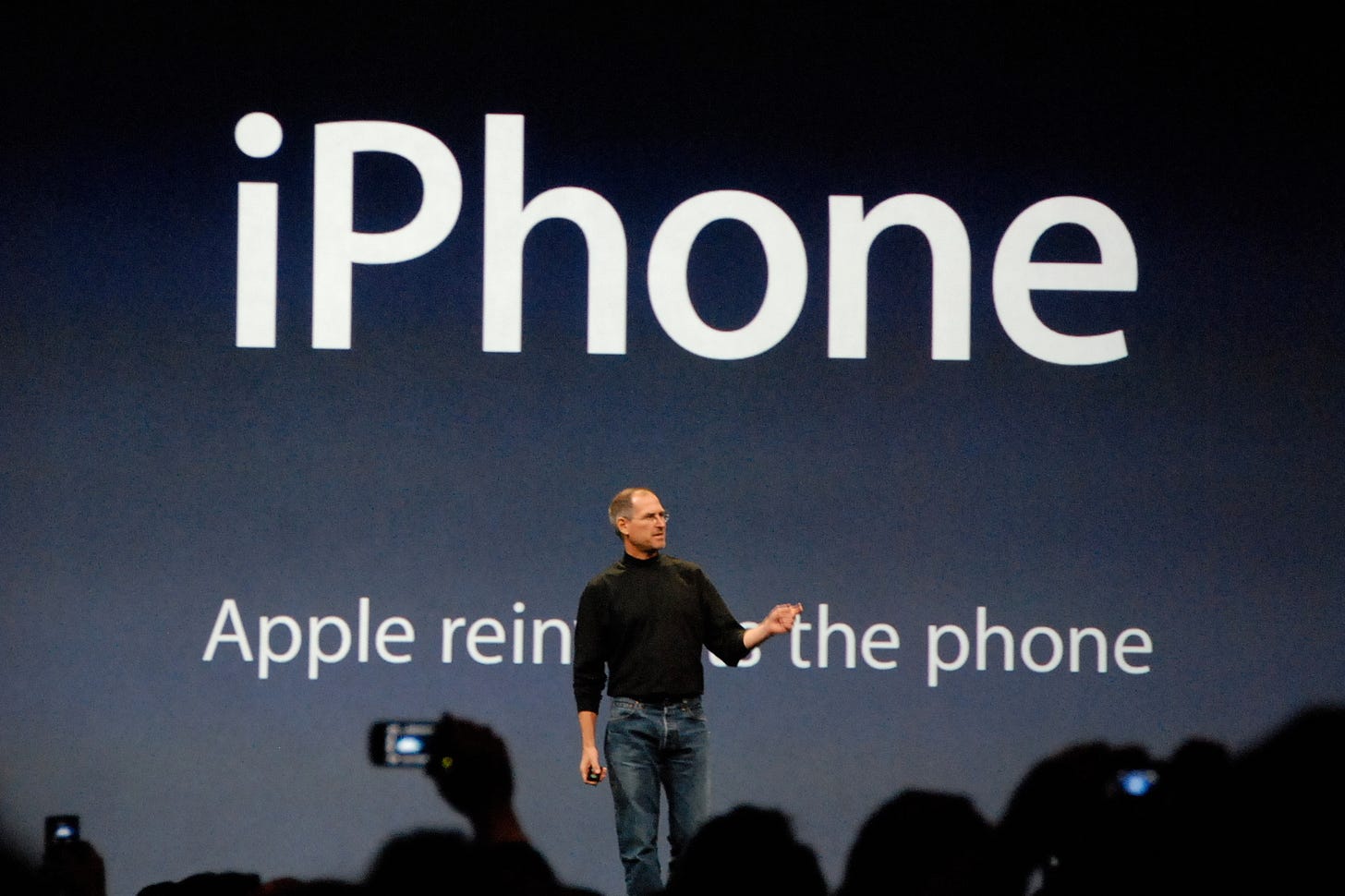Steve Jobs Got the iPhone Wrong (And We're Getting AI Wrong Too)
Why the future always surprises us—and what to do about it
PHOTO CREDIT: By Blake Patterson - originally posted to Flickr as Img0061, CC BY 2.0, https://commons.wikimedia.org/w/index.php?curid=141143563
“That the automobile has practically reached the limit of its development is suggested by the fact that during the past year no improvements of a radical nature have been introduced.” Scientific American, January 2, 1909
There is a growing chorus of writers telling us how AI will change the world. None of them are any better prepared to predict the future than Steve Jobs was to predict the future of the iPhone.
At its launch in 2007, Jobs proudly announced Apple’s new device would amaze the world by merging a traditional phone with a music player and "internet communicator." Making calls, he said, would be its "killer app." He completely missed the global ecosystem of apps, personalized digital lives, and economic upheaval that followed.
This pattern repeats with every radically transformative invention.
The first public railway line, a modest 26 miles connecting Shildon with Stockton-on-Tees in northeastern England, inspired many predictions. None foresaw single train cars stretching over four miles (nearly fifteen percent of that entire first line). No one imagined today's 800,000 miles of track crisscrossing the globe, driving mass migrations and spawning new industries.
Early airplane flights weren't expected to herald passenger services carrying 12 million people each day, many airborne for ten hours or more.
The first cars were horse substitutes, "horseless carriages," not the vehicles that would clog city streets and reshape human geography worldwide.
The Internet began as ARPANET, designed for a handful of scientists at four universities to share data. No one anticipated it would transform global communication.
AI today resembles those early days: first railway tracks being laid, horseless carriages stuck in the mud as often as moving, ARPANET connecting a few California and Utah scientists.
Such early times are thrilling. We should absolutely discuss AI's wonders. But beware anyone claiming to know what changes lie ahead. However well-informed they seem, no one predicts the future more accurately than Jobs predicted the iPhone's impact.
We can't even guess whose predictions will prove closest to reality. What we can assess is whether predictors have skin in the game. Always ask yourself what they gain if their vision comes true. Those warning of AI apocalypse may have different motives than those promising AI utopia. Both conscious and unconscious biases shape what people choose to emphasize or ignore.
So what can we do? Stopping speculation is impossible and foolish. But not knowing the future doesn't mean we shouldn't prepare, using whatever expertise and tools we have.
The challenge is making our speculation comprehensive enough. Current AI discourse focuses on jobs, media, politics, and other external effects. We must broaden this to include how AI may transform our inner lives as much as our outer ones.
We can't know exactly how AI will reshape human consciousness, but radical changes seem certain. We need robust descriptions of multiple possibilities to guide preparation for varied futures in how humans experience themselves and the world.
None of our scenarios will match our future reality, but preparing for multiple futures will help us manage whatever comes. We'll be better positioned to act, better informed about creating beneficial outcomes, if experts and citizens alike recognize a fourth revolution in human consciousness has begun. Accepting that we're in a mind revolution will focus our scenario planning on consciousness alongside economics and politics.







There is a saying about the future, that trying to predict it is like driving down a country road, at night, with your headlights off and looking through the rear view mirror. In other words, we should expect nothing and be prepared for everything. I believe that an open mind combined with critical thinking and adaptability, and a bit of skepticism for what we hear and read, is the way to navigate these unknown waters.
I really do think we're at a crossroads. AI isn't the threat. It's another tool that will be used to restrict, monitor and control our behavior. The scary thing is the public is always at least 10 years behind in knowing what's really technologically achievable. So if we think that tech start ups that needed millions in venture capital funding, just so we can use AI to design a web site or make music. What do you think our governments that spend billions every year on "research and development" are capable of? The US Pentagon gets over 1 trillion in funding a year. But this can't be even be verified, because they have never completed an audit. So who are they actually accountable too? Certainly no congress.